Eggs, Cheese, and Wine: California Day 3
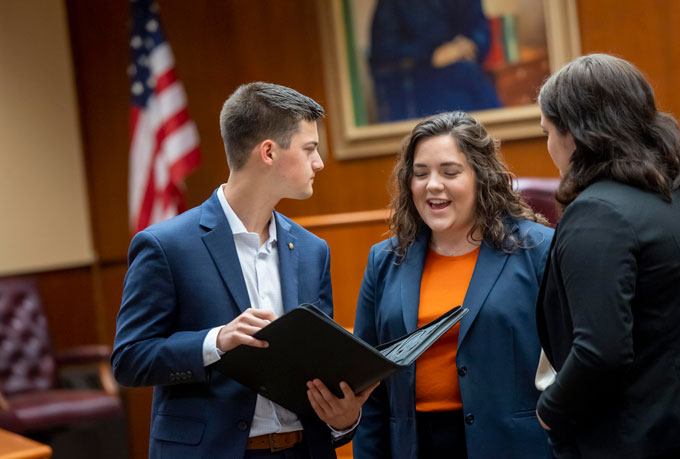
[ACE 292 Experiential Study Tour to California | Spring 2017]
The first stop of the day on March 21st was to the JS West Family Farm Eggs. We met with Tim Silva along with three other employees who gave us a tour of the chicken facility. They explained the transitions currently facing the egg industry. Large retailers are announcing that they will only be purchasing cage-free eggs starting in 2025. The problem is that there is little evidence that consumers are demanding cage-free eggs over traditional eggs. If producers were to switch to cage-free facilities at this moment, consumers would most likely not purchase them until prices dropped. On a brighter note, the farm implemented enhanced colonies for the chickens.
Here is an image of an enhanced colony:
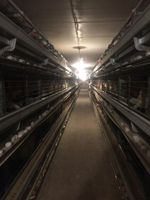
These colonies allow chickens to stretch, perch, move around, and otherwise exhibit natural behaviors while still allowing for optimum sanitation. This was an excellent investment because data has shown the best quality eggs come from this kind of environment. Mr. Silva stressed the importance of education on how eggs are produced. While these retailers are demanding cage-free eggs, they do not understand the disadvantages of this. Moreover, Mr. Silva noted that "cage-free" environments may not look the way consumers expect, making it uncertain whether future modifications will be needed.
Here is an image of a cage-free environment:
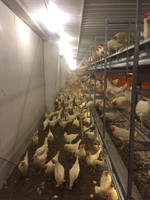
Overall, this stop was extremely educational and eye opening.
After the JS West Family Farm eggs, we had visited the Hilmar Cheese Company. Once we got there we were given a tour within our bus as Denise explained the operation and management that went on throughout the facility from the water management to the operation of milk that came in and out throughout the day. Once the tour had finished we were then able to get a taste of Hilmar Cheese and its wide variety of food inside. Afterwards, we were then able to have Burt speak with us about the management of the operations as well. When it comes to leadership, it’s important for the Hilmar Cheese Company to continue to thrive and show other companies sustainability within their company.
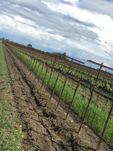
The next stop of the day was to the Gallo Vineyards to meet with Alan Reynolds. Alan oversees over 15,000 acres of land that the Gallo family owns. Alan was very knowledgeable about all things that had to do with the vineyard and the work that goes into properly raising the plants. Alan spoke to us about how he and his crew have had difficulty this year predicting the weather patterns because 2017 has been such an odd climate year for California. He still has over 200 acres of vineyards under water, and he is unsure how the crop will turn out due to possible rot. Mr. Reynolds spoke to us about one specific topic that went along with the main theme of our course: labor policies.
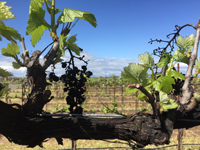
He explained that California legislature passed a bill to limit agricultural workers to 8 hours a day, and laborers can only work 6 days a week, not 7. Now why is this an issue? Because in California, there is already a shortage of workers to work in the fields, and in peak harvesting times, there is a necessity to have workers in the fields to harvest the grapes immediately so that they do not begin fermenting or drying out. The other issue that arises is that workers want to work those times because they need to make money for their families; they’re not being forced into these hours. Alan Reynolds said that the real solution to the issue should come from legislators speaking to the field workers and farmers rather than solely consulting activist groups.
We finished our day by visiting the Turlock Irrigation District and talked with Michael Frantz, a district board member. He discussed the current issues and policies the state of California is facing in regards to water usage and availability. It was interesting to learn about the different perspectives in the state as well as their true environmental passions. During this discussion, Mr. Frantz brought up the fact that California had been facing many years of drought and this year was the wettest they'd had in 150 years. This illustrated how unpredictable California weather can be. He then elaborated that due to the previous drought, the well-respected fish species of salmon has been slowly decreasing in population. The fishing industry has introduced the striped bass, an invasive fish species, which has also contributed to the decline in salmon population. His suggestions were to decreases limitations on striped bass fishing, which would in turn bring up the numbers of salmon. It was a very educational visit, and we were thankful for the opportunity to meet with him.